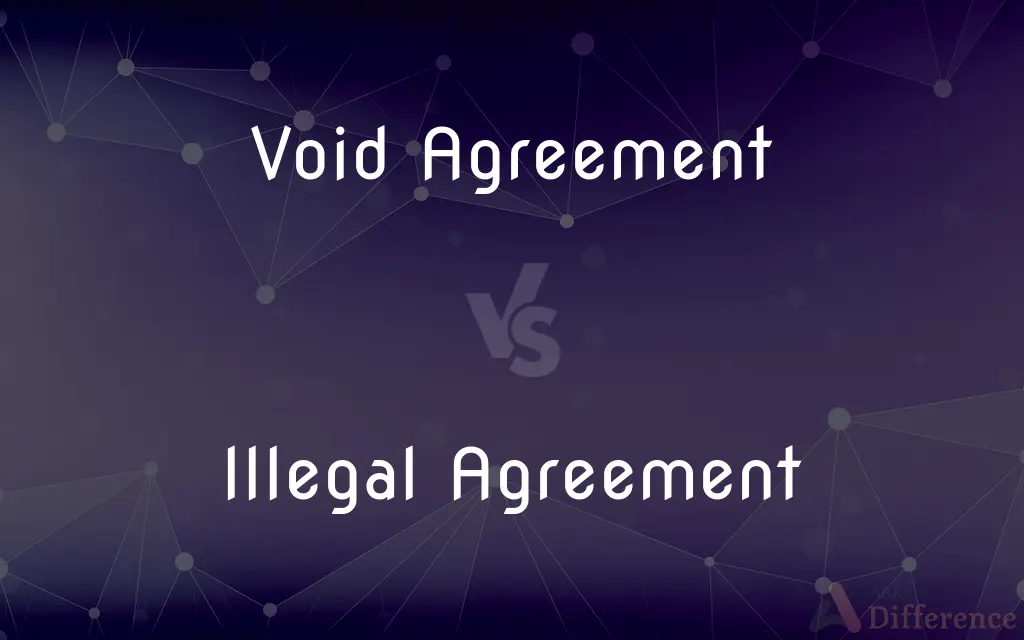Void Agreement vs. Illegal Agreement — What's the Difference?
Edited by Tayyaba Rehman — By Fiza Rafique — Published on December 26, 2023
Void Agreement lacks legal enforceability due to inherent defects, while Illegal Agreement involves terms that breach the law.

Difference Between Void Agreement and Illegal Agreement
Table of Contents
ADVERTISEMENT
Key Differences
A Void Agreement refers to a contract that lacks one or more essential elements, rendering it unenforceable in a court of law. On the other hand, an Illegal Agreement is a contract that involves acts or objectives which directly violate established laws or statutes.
Void Agreements, from inception, have no legal effect due to missing prerequisites like mutual consent or a lawful consideration. In contrast, Illegal Agreements go beyond being merely unenforceable—they actively contravene the law and may invite penalties.
The very nature of a Void Agreement implies that it was never a valid contract to begin with. An Illegal Agreement, however, is not just void, but its execution can lead to legal consequences against the involved parties.
Void Agreements can arise from innocent misunderstandings or oversights when forming a contract. Illegal Agreements, conversely, inherently involve parties knowingly or unknowingly entering into agreements that are prohibited by law.
Comparison Chart
Nature
Lacks legal enforceability
Violates laws or statutes
ADVERTISEMENT
Validity
Never a valid contract
Void and against the law
Consequences
No legal effects
Legal consequences and penalties
Cause
Missing prerequisites for a valid contract
Inherently prohibited actions
Examples
Agreement without mutual consent
Agreement to commit a crime
Compare with Definitions
Void Agreement
A contract lacking legal enforceability.
Their business deal was considered a Void Agreement due to unclear terms.
Illegal Agreement
A contract involving prohibited actions.
Entering into an Illegal Agreement to smuggle goods can lead to imprisonment.
Void Agreement
Cannot be upheld in a court of law.
They couldn't sue for breach because it was a Void Agreement.
Illegal Agreement
Involves terms that are legally prohibited.
An agreement promoting insider trading is an example of an Illegal Agreement.
Void Agreement
Results from misunderstandings or oversights.
Due to a communication error, they unintentionally entered into a Void Agreement.
Illegal Agreement
Results from actions against societal norms and regulations.
Agreeing to launder money is undoubtedly an Illegal Agreement.
Void Agreement
Never regarded as a valid contract from its inception.
The parties later realized that their arrangement was a Void Agreement from the start.
Illegal Agreement
Directly contravenes established laws.
Their pact to rig the bid was an Illegal Agreement and led to legal consequences.
Void Agreement
Lacks essential elements for contract validity.
The absence of mutual consent made their pact a Void Agreement.
Illegal Agreement
Not just unenforceable but punishable.
The Illegal Agreement they formed exposed them to hefty fines.
Common Curiosities
Can a Void Agreement be ratified?
No, a Void Agreement, being inherently defective, cannot be ratified or made valid.
How does an Illegal Agreement differ?
An Illegal Agreement involves acts or terms that directly violate established laws.
Is every Void Agreement illegal?
No, while every Illegal Agreement is void, not every Void Agreement is illegal.
What's an example of an Illegal Agreement?
An agreement to commit a crime, like robbery, is an Illegal Agreement.
What is a Void Agreement?
A Void Agreement is a contract that lacks legal enforceability due to inherent defects.
Can a party sue based on a Void Agreement?
No, a Void Agreement cannot be upheld in court since it lacks legal enforceability.
Are all unenforceable agreements void?
No, but all Void Agreements are unenforceable.
Are Illegal Agreements always intentional?
No, parties can unknowingly enter Illegal Agreements if unaware of certain laws.
Do Void Agreements have any legal effect?
No, Void Agreements have no legal effect or enforceability.
Are there degrees of illegality in Illegal Agreements?
Yes, the gravity of the illegality in Illegal Agreements can vary based on the nature of the violation.
Can you provide an example of a Void Agreement?
An agreement without mutual consent or a clear objective can be a Void Agreement.
Are parties penalized for Illegal Agreements?
Yes, parties to an Illegal Agreement can face legal consequences and penalties.
Why might an agreement be void?
An agreement might be void due to missing essential elements like mutual consent or lawful consideration.
Are there any remedies for parties in an Illegal Agreement?
Generally, the law doesn't provide remedies for parties to an Illegal Agreement, as it contravenes societal norms.
Can a contract start as valid and later become void?
Yes, certain events or changes can render a previously valid contract into a Void Agreement.
Share Your Discovery

Previous Comparison
Aluminum Foil vs. Tin Foil
Next Comparison
Daniell Cell vs. Galvanic CellAuthor Spotlight
Written by
Fiza RafiqueFiza Rafique is a skilled content writer at AskDifference.com, where she meticulously refines and enhances written pieces. Drawing from her vast editorial expertise, Fiza ensures clarity, accuracy, and precision in every article. Passionate about language, she continually seeks to elevate the quality of content for readers worldwide.
Edited by
Tayyaba RehmanTayyaba Rehman is a distinguished writer, currently serving as a primary contributor to askdifference.com. As a researcher in semantics and etymology, Tayyaba's passion for the complexity of languages and their distinctions has found a perfect home on the platform. Tayyaba delves into the intricacies of language, distinguishing between commonly confused words and phrases, thereby providing clarity for readers worldwide.














































